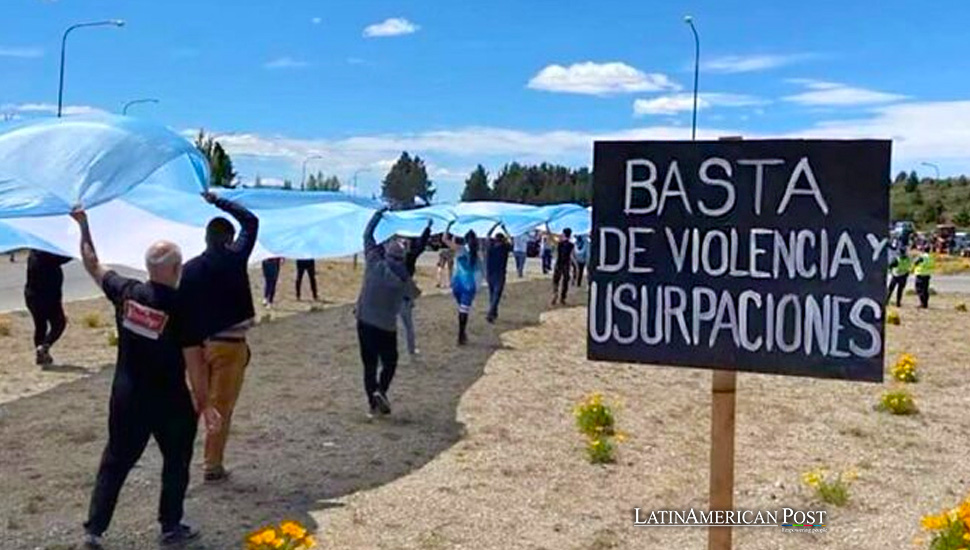Argentine Justice Orders Eviction of Illegally Occupied Military Lands in Bariloche

In a decisive action, Argentine courts mandated the eviction of lands in Bariloche, owned by the Argentine Army. They allegedly unlawfully occupied Mapuche communities, signaling a significant legal and societal confrontation.
Legal Battle Unfolds in Bariloche
In the scenic city of Bariloche, located in the province of Río Negro, a legal battle has unfolded that underscores the complex interplay of indigenous rights, environmental conservation, and national defense interests in Argentina. The Argentine Justice Department has ordered the eviction of lands belonging to the Argentine Army, which have been reportedly occupied illegally by Mapuche communities. This decision, announced by official sources, marks a pivotal moment in Argentina’s ongoing struggle to balance the rights and claims of its indigenous populations against the backdrop of state sovereignty and environmental preservation.
The Ministry of Defense, following complaints from residents and its allegations, brought the issue to the Federal Justice, which ruled in favor of evicting the occupiers from the military-owned lands near Moreno Lake. These lands, designated as part of an urban natural reserve in 2013, have become the center of a contentious debate about land rights, indigenous claims, and environmental stewardship.
The situation escalated when residents near the disputed area reported that the occupants had begun to clear the land, allegedly to subdivide and sell the plots through WhatsApp. This act violates property rights and poses a significant threat to the area’s ecological integrity.
Ministry of Defense Takes Legal Action
In response to these events, Luis Petri, at the helm of the Defense Ministry, announced that the Ministry would actively participate in the legal proceedings as a plaintiff. The investigation will explore the alleged illegal occupation and related crimes, including fraud, deforestation of native forests, and potential involvement in illicit associations.
This case is emblematic of a broader historical context in Argentina, where the struggle for land rights has deep roots. The Mapuche, as one of the largest indigenous groups in Argentina, have long asserted their rights to traditional lands, a contention that has frequently put them at odds with private landowners and the state. The conflict in Bariloche is a contemporary manifestation of these enduring tensions, encapsulating indigenous sovereignty, environmental conservation, and national defense issues.
Argentina’s history of land disputes dates back to the colonial era, intensifying during the 19th-century Conquest of the Desert, a military campaign that aimed to assert control over Patagonia, displacing many indigenous communities. The legacy of these conflicts continues to influence contemporary land rights debates, with indigenous groups seeking recognition and restitution for their ancestral lands.
The Ministry of Defense’s involvement in the case, coupled with the public statements by officials like Luis Petri, highlights the government’s stance on land usurpation and its commitment to enforcing the law. Petri’s congratulatory message to the prosecution and the judiciary for their swift action underscores the government’s position that illegal occupation constitutes a criminal offense, echoing President Javier Milei’s sentiment that legal transgressions will not be tolerated.
As the Defense Ministry prepares a comprehensive analysis of the case, encompassing charges of usurpation and associated offenses, this legal confrontation raises crucial questions about the balance between defending property rights and acknowledging indigenous land claims. Moreover, the reported deforestation activities related to the occupation bring to the forefront the urgent need for sustainable land management practices that protect Argentina’s rich biodiversity.
Bariloche Case as a Microcosm
This case in Bariloche is a microcosm of Argentina’s challenges as it navigates the complexities of modern governance, indigenous rights, and environmental conservation. The eviction order represents a legal resolution to a property dispute and a critical juncture in the country’s ongoing dialogue about justice, sovereignty, and sustainability.
As Argentina continues to grapple with these issues, the outcome of the Bariloche case may set important precedents for how the nation addresses similar conflicts in the future. It serves as a reminder of the delicate balance that must be struck between honoring the historical and cultural claims of indigenous peoples and safeguarding the interests of the state and the environment. In this context, the actions of the Ministry of Defense, the judiciary, and the local community in Bariloche will be closely watched, as they can influence the direction of Argentina’s policies on land rights and conservation for years to come.
Also read: Setback for Argentina’s Economic Reform as Milei’s Ambitious Package Faces New Legislative Hurdles
Ultimately, the Bariloche eviction order is pivotal in the tapestry of Argentine land disputes, encapsulating the multifaceted challenges of reconciling historical injustices with contemporary legal and environmental imperatives. As the nation moves forward, the lessons learned from this episode will undoubtedly inform its approach to similar issues, underscoring the importance of dialogue, legal clarity, and respect for indigenous traditions and national laws in shaping a more equitable and sustainable future.





